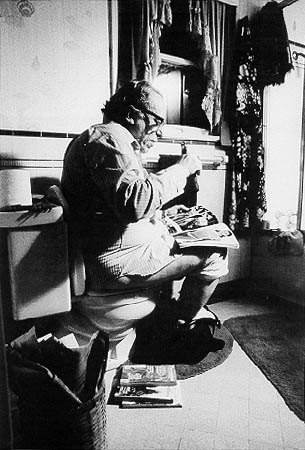White Noise
Back in highschool, me and my friend Les would often stand in the hallway near our lockers during passing period and stare out the door. We wouldn’t talk to each other. We were too busy listening and didn’t want to interrupt what we were hearing: the sound of 400 students gossiping, spilling books, taunting, laughing, slamming lockers, eating snacks, chasing each other, smacking gum, copying homework, making out, tearing pages out of notebooks, etc. When we didn’t focus on one sound at a time but the on whole sound: a low penetrating, ominous, rumble would emerge. It was a hum you would hear only if you knew it was there. Soon, we noticed this could be done almost anywhere. It fascinated us, how this sound seemed to stand on its own, beyond the individuals creating it. Les was the only one I had ever told about my listening to this sound. I think because I thought he would be one of the few I knew who could appreciate it. To this day I could walk up behind Les and hum, and he’d know exactly what I was referring to: white noise.
As a close friend of pop culture, it’s very surprising that I thought Don DeLillo’s White Noise was, in a word, boring. At least mostly boring. The novel held some appealing wit. The scene with like the “Most Photographed Barn In America”, the near plane crash, and some of Jack Gladney’s conversations with his family I found really amusing in DeLillo’s dark and dry way. And though at times the novel produced a disturbed chuckle from me, I wouldn’t say that it was hilarious or even funny, really. In fact much of the time it was annoying and tedious. Yes, this novel was clever, but despite having many facets, it was not fascinating.
It’s true that the meat of DeLillo’s White Noise is held in its observations, not in its plot. But the story held almost no plot. The main character in White Noise tells us that all plots move deathward. Is it a valid reason for Delillo not to include a plot in this novel? I don’t think so.
It could very well be that I have become so accustomed to the torrent of information, often useless, swirling around me that I don’t think that the racket that it creates is worthy of a novel itself. Let alone bothering to read that novel. White Noise seems to be just more white noise. It’s not lost on me that may be exactly what DeLillo had intended.
I did enjoy the cultural themes presented in the novel. DeLillo reveals to us how we as participants in American culture are often more interested in the copy than in the original. We as a culture reject the real event in favor of the simulation. Representation supersedes experience. I also enjoyed the idea that death seems to be the only concept that can equal our society’s white noise in sheer force. And despite popular culture using glitz, packaging, and showiness in an attempt to hide death beneath the surface, death is in the end, inevitable. Despite what DeLillo is trying to portray, I don’t think death has disappeared from american culture, my death clock is testimony to that. Maybe I’m missing something. On the other hand, maybe I get it.
Is Don DeLillo’s novel White Noise high-end art? Maybe. Enjoyable? Maybe not.
…

